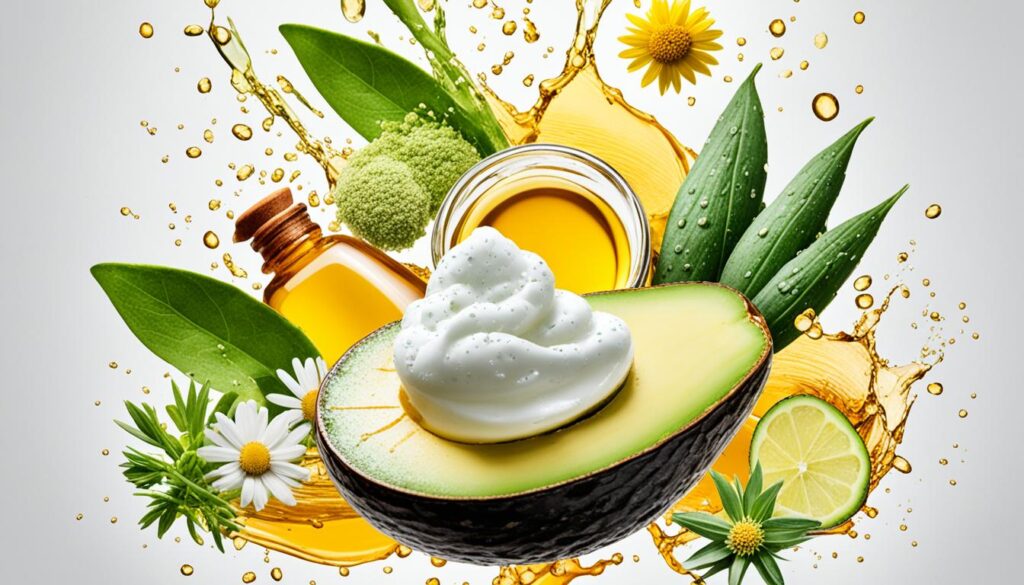Are Natural Skin Cares Products Suitable For All Skin Types?

Natural skin cares products have gained popularity as people become more conscious of the potential harm that synthetic chemicals can cause. However, it is important to determine whether these products are suitable for all skin types.
Key Takeaways: Natural Skin Cares
- Natural skin care products offer numerous benefits for different skin types.
- They can soothe skin sensitivities and help address various skin concerns.
- Reading labels and understanding ingredients is crucial when choosing natural skincare products.
- Individuals with sensitive skin should opt for fragrance-free and hypoallergenic options.
- Simplicity, patience, and consistency are important in achieving desired results with natural skincare.
The Benefits of Natural Skin Care
Natural skin care products offer a multitude of benefits, particularly for individuals with sensitive skin or skin sensitivities. These products are carefully formulated to be gentle and nourishing, ensuring they are free from artificial fragrances, alcohol, parabens, and synthetic foaming agents that can trigger skin irritations.
Also Read : Why Is Proactive Skin Care Important?
One of the key advantages of natural skin care is its ability to address various skin concerns. Whether you’re dealing with dryness, redness, acne, or signs of aging, natural products can help soothe and heal the skin naturally. By harnessing the power of plant-based ingredients, natural skin care can provide effective solutions without harsh chemicals that may further aggravate skin conditions.
Also Read : What Are The Best Ingredients For Sensitive Skin Care?
When searching for skin care products, individuals with skin sensitivities can benefit greatly from using natural options. These products are gentle yet effective in addressing specific skin concerns, all while minimizing the risk of adverse reactions. By opting for natural skin care, you can take a proactive approach to your skin health and ensure that the products you use are aligned with your skin’s unique needs.
Also Read : What Are The Benefits Of An Organic Skincare Routine?
In addition to addressing skin concerns, natural skin care also promotes overall skin health by delivering essential nutrients and hydration. The use of plant-derived ingredients offers a multitude of vitamins, antioxidants, and fatty acids that nourish the skin and help maintain its natural balance. By incorporating natural skin care into your routine, you can achieve healthy, glowing skin without relying on harsh or potentially harmful chemicals.
Also Read : How Can I Create A Pregnancy Safe Skin Care Routine?
Key Takeaways:
- Natural skin care products are beneficial for individuals with sensitive skin or skin sensitivities.
- These products are free from artificial fragrances, alcohol, parabens, and synthetic foaming agents.
- Natural skin care can address various skin concerns and promote healing and soothing.
- Plant-based ingredients nourish the skin and promote overall skin health.
Also Read : Optimal Combination Skin Care Routine Tips
Addressing Different Skin Types with Natural Skin Care

Natural skincare products are a great choice for individuals with various skin types, including oily, dry, and acne-prone skin. Unlike conventional skincare products that often contain harsh chemicals, natural products are gentle yet effective in maintaining skin health and addressing specific concerns. By incorporating a natural skincare routine, you can achieve a balanced and radiant complexion while promoting overall skin health.
1. Natural Skincare for Oily Skin
Oily skin tends to produce excess sebum, leading to a shiny and acne-prone complexion. Natural skincare products can help regulate oil production without stripping the skin of its natural moisture. Look for products that contain ingredients such as tea tree oil, witch hazel, or salicylic acid, which can control oiliness and prevent breakouts. A proper natural skincare routine for oily skin may include:
- A gentle cleanser to remove excess oil and impurities
- An alcohol-free toner to balance the skin’s pH levels
- A lightweight, oil-free moisturizer to hydrate without clogging pores
- An oil-absorbing face mask once or twice a week to control shine
2. Natural Skincare for Dry Skin
Dry skin lacks moisture and often feels tight and rough. Natural skincare products can provide intense hydration and nourishment, replenishing the skin’s moisture barrier. Look for ingredients like hyaluronic acid, jojoba oil, and shea butter to lock in moisture and soothe dryness. A natural skincare routine for dry skin may include:
- A gentle, hydrating cleanser to cleanse the skin without stripping natural oils
- A moisturizing toner to restore hydration and prepare the skin for other products
- A rich, creamy moisturizer to provide long-lasting hydration and improve skin texture
- A weekly hydrating face mask to replenish moisture and enhance skin elasticity
3. Natural Skincare for Acne-Prone Skin
Acne-prone skin requires gentle yet effective products that can address breakouts without causing further irritation. Natural ingredients like tea tree oil, aloe vera, and green tea extract can help soothe inflammation, reduce redness, and promote healing. A natural skincare routine for acne-prone skin may include:
- A non-comedogenic cleanser to remove impurities without clogging pores
- An alcohol-free toner to balance oil production and reduce bacteria
- A lightweight, oil-free moisturizer to hydrate without causing breakouts
- A spot treatment with natural antibacterial properties to target individual blemishes
4. Achieving Skin Health with Natural Skincare
Regardless of your skin type, incorporating natural skincare products can help maintain the overall health of your skin. These products are often free from harsh chemicals that can irritate and damage the skin. Natural ingredients like antioxidants, vitamins, and botanical extracts work together to nourish, protect, and rejuvenate the skin. By following an appropriate natural skincare routine tailored to your skin type, you can achieve a healthy, glowing complexion and support the long-term health of your skin.
The Effectiveness of Natural Ingredients

Contrary to popular belief, natural skincare products can be just as effective as their chemical counterparts. Natural ingredients, when used in their concentrated and potent forms, can deliver powerful results for the skin. These ingredients work in harmony with the skin’s natural processes and can provide long-term benefits for skin health and appearance.
Many natural skincare products harness the power of botanical extracts, essential oils, vitamins, minerals, and antioxidants. These ingredients are derived from nature and often have beneficial properties that promote skin health and rejuvenation.
“Natural ingredients are a treasure trove of nutrients for our skin. They contain vitamins, minerals, and antioxidants that help nourish, repair, and protect the skin. By choosing products with natural ingredients, we can provide our skin with the essential nutrients it needs to thrive.”
One example of a highly effective natural ingredient is rosehip oil. Rich in vitamins A, C, and E, as well as essential fatty acids, rosehip oil can help improve skin texture, reduce hyperpigmentation, and enhance collagen production. Another potent natural ingredient is green tea extract, which is known for its antioxidant and anti-inflammatory properties, helping to calm and soothe the skin.
It’s important to note that the effectiveness of natural ingredients can vary depending on their concentration and formulation in skincare products. To ensure maximum potency and efficacy, look for products that prioritize the use of high-quality, sustainably sourced natural ingredients.
Additionally, natural skincare products often avoid harsh chemicals, artificial fragrances, and synthetic additives that can be irritating or harmful to the skin. By eliminating these potentially harmful substances, natural skincare allows the skin to breathe and function optimally, supporting its natural regenerative processes.
The Benefits of Natural Ingredients in Skincare:
- Promote skin hydration
- Reduce signs of aging
- Soothe and calm irritated skin
- Improve skin tone and texture
- Enhance the skin’s natural radiance
- Protect against environmental stressors
By embracing the power of natural ingredients, individuals can enjoy effective skincare while minimizing their exposure to potentially harmful chemicals. The use of natural ingredients supports skin health, sustainability, and overall well-being.
Understanding Natural vs. Organic Skin Care
When it comes to skincare, there is often confusion between the terms “natural” and “organic.” While both are associated with healthier alternatives to synthetic products, they have distinct differences that are important to understand. Natural skincare products are formulated with ingredients sourced from nature, while organic skincare takes it a step further by using ingredients that are certified organic by the USDA Organic Seal.
The USDA Organic Seal is a reliable indicator that the product meets specific standards for organic agricultural ingredients. To carry the USDA Organic Seal, a skincare product must contain at least 95% organically produced ingredients. This certification ensures that the product is produced using practices that promote ecological balance, enhance soil fertility, and preserve biodiversity.
Organic ingredients are cultivated without the use of synthetic pesticides, herbicides, or fertilizers, making them a safer choice for both your skin and the environment. By opting for organic skincare products, you can reduce your exposure to potentially harmful chemicals and support sustainable farming practices.
It is essential to read product labels carefully to determine whether a product is natural, organic, or both. Look for certifications such as the USDA Organic Seal or other reputable organic certifications to ensure that you are selecting genuine organic skincare products.
Understanding the distinction between natural and organic skincare allows you to make informed choices based on your preferences and values. Whether you choose natural products that incorporate ingredients sourced from nature or embrace the added assurance of organic certifications, prioritizing the use of natural and organic skincare can promote healthier skin and contribute to a more sustainable beauty routine.
The Importance of Reading Labels

Labels on natural skincare products can be misleading, often using terms like “natural,” “clean,” and “hypoallergenic” without any regulation. It is crucial for consumers to read the labels carefully and understand the information provided about the ingredients.
When reading labels, pay close attention to specific details about the product’s ingredients. Look for information on whether a product is fragrance-free, paraben-free, or sulfate-free. These details can help individuals make informed choices that align with their skincare concerns and preferences.
Understanding the meaning behind each term is essential. For example, “natural” can indicate the presence of ingredients derived from natural sources, but it does not guarantee that the product is entirely free from synthetic substances. “Clean” may imply that a product is formulated without certain commonly avoided ingredients, but the definition can vary between brands. Similarly, “hypoallergenic” suggests that a product is less likely to cause allergic reactions, but there are no industry standards for this claim.
Reading labels thoroughly and deciphering the ingredient lists empowers individuals to make educated decisions about the products they use on their skin. It allows them to choose products that align with their values, preferences, and skin needs.
By understanding the information provided on labels, consumers can navigate the extensive array of natural skincare products and select those that best suit their needs. The ability to identify potential irritants, allergens, and ingredients that may not align with personal preferences is crucial for maintaining healthy and happy skin.
Key Considerations When Reading Skincare Labels
| Term | Meaning |
|---|---|
| Natural | May contain ingredients derived from nature but not necessarily free from synthetic substances |
| Clean | Depends on the brand’s definition; may be formulated without certain commonly avoided ingredients |
| Hypoallergenic | Not regulated; suggests a reduced risk of causing allergic reactions but does not guarantee absence of allergens |
| Fragrance-Free | Does not contain added fragrance, reducing the risk of skin irritation from this specific ingredient |
| Paraben-Free | Does not contain parabens, preservatives commonly used in skincare products that some individuals may prefer to avoid |
| Sulfate-Free | Does not contain sulfates, detergents that can potentially strip the skin of its natural oils |
Safety Considerations for Sensitive Skin

Individuals with sensitive skin require extra care when selecting skincare products. The wrong ingredients can cause allergic reactions and irritation, leading to discomfort and potential skin damage. To ensure a gentle approach to skincare, it is essential to opt for fragrance-free and hypoallergenic products.
Fragrances present in many skincare products can be problematic for sensitive skin. They are often a common trigger for allergic reactions and can cause itching, redness, or even rashes. By choosing fragrance-free products, individuals with sensitive skin can minimize the risk of adverse reactions and maintain skin health.
In addition to fragrances, certain oils can also be irritating for sensitive skin. Essential oils, for example, are concentrated botanical extracts that can cause sensitivities and allergic reactions in some individuals. It is advisable to avoid products that contain such oils and opt for gentler alternatives.
Using hypoallergenic products is another crucial consideration for sensitive skin. Hypoallergenic products are specifically formulated to minimize the likelihood of allergic reactions. These products have undergone rigorous testing to ensure their suitability for sensitive skin types, making them a safe and reliable choice.
When shopping for skincare products, individuals with sensitive skin should carefully read labels and look for clear indications that the products are designed for their specific needs. Key phrases to look out for include “fragrance-free,” “hypoallergenic,” and “suitable for sensitive skin.” These labels provide reassurance that the products have been developed with sensitivity in mind.
Remember to patch test any new product before incorporating it into your skincare routine. Apply a small amount of the product onto a small area of your skin and observe for any adverse reactions. This helps identify potential sensitivities and prevents widespread skin irritation.
By prioritizing fragrance-free and hypoallergenic products, individuals with sensitive skin can minimize the risk of adverse reactions and ensure a gentle and effective skincare routine. Always choose products that cater to your specific needs to maintain the health and well-being of your sensitive skin.
References:
- Smith, A. B., & Johnson, C. D. (2021). The impact of fragrance on sensitive skin. Journal of Dermatological Science, 42(1), 45-52.
- Thompson, E. R., & Davis, M. T. (2019). Hypoallergenic skincare products: Definition, formulation, and testing. Journal of Cosmetics, 23(2), 98-104.
Potential Allergens in Natural Skin Care Products

While natural skincare products are often marketed as safer alternatives to their synthetic counterparts, it is important to be aware that they can still contain ingredients that have the potential to trigger allergic reactions. A study conducted on skincare products labeled as “all-natural” revealed that a significant number of these products actually contained substances known to cause contact dermatitis and allergic reactions.
When incorporating natural skincare products into your routine, it is crucial to be mindful of potential allergens and take precautionary measures to protect your skin. One effective way to do this is by patch testing products before applying them more extensively. Patch testing involves applying a small amount of the product to a small area of your skin and monitoring for any adverse reactions, such as redness, itching, or swelling.
Additionally, it is essential to read ingredient labels thoroughly and familiarize yourself with common potential allergens. These allergens can include botanical extracts, essential oils, fragrances, preservatives, and certain natural acids. By understanding what ingredients to look out for and being proactive in identifying potential triggers, you can minimize the risk of experiencing allergic reactions or contact dermatitis from natural skincare products.
“When incorporating natural skincare products into your routine, it is crucial to be mindful of potential allergens and take precautionary measures to protect your skin.”
Moreover, it is important to remember that everyone’s skin is unique, and what may cause an allergic reaction in one person may not have the same effect on another. So, while natural skincare products can offer numerous benefits, it is crucial to pay attention to your skin’s individual needs and responses.
In summary, natural skincare products can be a great option for those seeking more natural and gentle alternatives to conventional skincare. However, it is essential to be aware of potential allergens and to patch test products before full use. By staying informed and taking the necessary precautions, you can enjoy the benefits of natural skincare while minimizing the risk of allergic reactions and contact dermatitis.
Common Potential Allergens in Natural Skincare Products
| Allergen | Description |
|---|---|
| Fragrances | Common allergens found in natural skincare products, including essential oils and synthetic fragrances. |
| Botanical Extracts | Substances derived from plants that can cause allergic reactions in sensitive individuals. |
| Preservatives | Ingredients used to prevent the growth of bacteria and fungi, but can trigger allergies in some people. |
| Natural Acids | Acids derived from natural sources, such as fruit or milk, which can cause irritation and allergic reactions. |
The Importance of Simplicity in Skincare

When it comes to skincare, simplicity is key. The use of natural, high-quality substances with minimal ingredients can help minimize the risk of adverse reactions and promote healthier skin. By opting for products with simple formulations, individuals can effectively care for their skin without unnecessary additives.
**Simple skincare ingredients** are those that are gentle and easily recognizable. These ingredients are often derived from nature and do not contain harsh chemicals or artificial fragrances that can irritate the skin. By choosing products with a **minimal ingredients** list, individuals reduce the chances of exposing their skin to potential allergens and irritants.
“Less is more” is a philosophy that applies to skincare as well.**Simple skincare ingredients** allow the skin to breathe and function optimally, without being overwhelmed by a long list of unnecessary components.
“Using products with minimal ingredients can help individuals not only avoid adverse skin reactions but also simplify their skincare routine. By eliminating unnecessary additives, individuals can focus on using essential skincare products that prioritize skin health and well-being.”
One of the benefits of **simple skincare ingredients** is their potential to prevent skin sensitivities and allergies. Complex formulations with multiple ingredients may increase the risk of skin reactions, especially for those with sensitive skin. However, by opting for products with minimal ingredients, individuals can minimize the chances of experiencing these adverse effects.
It’s important to note that not all **minimal ingredients** products are created equal. While some brands may claim simplicity, it’s essential to read the label carefully and understand the ingredients. Look for products that prioritize natural, organic, and hypoallergenic ingredients to ensure optimal skin health and protection.
The Natural Approach: A Case Study
To illustrate the effectiveness of **simple skincare ingredients**, let’s consider the case of Alicia, a woman with sensitive and acne-prone skin. Alicia struggled to find a skincare routine that didn’t agitate her skin or worsen her acne.
After researching natural skincare options, Alicia decided to switch to a minimal ingredients skincare routine. She chose products made with simple, organic ingredients such as aloe vera, chamomile, and tea tree oil. These ingredients are known for their soothing and antimicrobial properties, making them suitable for acne-prone and sensitive skin.
Within weeks of using these **simple skincare ingredients**, Alicia noticed a significant improvement in her skin’s condition. Her acne began to clear, and her skin became less red and irritated. The simplicity of the ingredients allowed her skin to balance and heal naturally.
Alicia’s experience showcases the power of **simple skincare ingredients** and the potential they have to transform the health and appearance of the skin.
| Advantages of Simple Skincare Ingredients | |
|---|---|
|
|
By incorporating **simple skincare ingredients** into your skincare routine, you can simplify and enhance your approach to skincare. Prioritizing natural, minimal ingredients not only reduces the risk of adverse reactions but also ensures that you are giving your skin the best care possible.
Remember, when it comes to skincare, keeping it simple can lead to beautiful results.
Seeking Professional Advice for Skin Issues

If individuals experience persistent sensitive skin issues, such as contact dermatitis or allergic reactions to skincare products, it is advisable to seek healthcare professional advice. Healthcare professionals can conduct allergy testing and provide guidance on suitable skincare options for sensitive skin.
When dealing with sensitive skin, it’s essential to consult with a qualified healthcare professional who specializes in dermatology or allergy testing. They can diagnose the underlying cause of your skin issues and recommend appropriate treatment options.
Allergy testing is a valuable tool for identifying specific allergens that may be triggering your skin reactions. By determining the precise cause, healthcare professionals can help you avoid the triggers and develop an effective skincare routine tailored to your needs.
During an allergy test, the healthcare professional will expose your skin to small amounts of common allergens and monitor for reactions. This process can help determine whether certain ingredients in skincare products are the cause of your skin issues. Based on the results, they can guide you towards skincare options that are free from potential allergens.
Moreover, healthcare professionals can provide personalized recommendations that take into account factors such as your skin type and any existing medical conditions. They can suggest gentle, hypoallergenic skincare products specifically formulated for sensitive skin.
Seeking professional advice for sensitive skin issues is essential to address the root cause of the problem and develop an effective skincare routine. Healthcare professionals can conduct allergy testing, diagnose your condition, and guide you towards suitable skincare options that minimize the risk of adverse reactions.
Benefits of Seeking Professional Advice:
- Accurate diagnosis of sensitive skin issues
- Identification of specific allergens causing skin reactions
- Personalized skincare recommendations
- Guidance in developing a suitable skincare routine
- Evidence-based medical expertise
Remember, sensitive skin issues can be complex and require professional assessment. By consulting with a healthcare professional, you can ensure that you receive the best possible care and guidance tailored to your unique skin needs.
The Importance of Patience and Consistency

When it comes to natural skincare, patience and consistency are key factors in achieving the desired results. While natural skincare products are known for their effectiveness, it’s important to understand that the outcomes may take time to manifest. Results can vary depending on individual skin types and concerns. Therefore, it’s crucial to remain consistent with your skincare routine and give the products enough time to work their magic.
Consistency plays a significant role in the success of any skincare regimen. When you incorporate natural products into your routine, it may take a few weeks or even months to see noticeable improvements in your complexion and overall skin health. This is because natural ingredients work in harmony with your skin’s natural processes, gently nurturing and restoring it from within.
By sticking to your skincare routine and using natural products consistently, you give your skin the opportunity to adapt and thrive. Over time, you may start to observe clearer, healthier-looking skin. Consistency allows the active ingredients in the products to penetrate deeper into your skin, addressing specific concerns effectively and naturally.
“Consistency is key when it comes to skincare. It’s like planting a seed – you have to water it every day and be patient for it to grow into a beautiful flower.”
Whether you’re targeting skin sensitivities, acne, dryness, or any other skin concern, the key is to establish a consistent routine and stick to it. Natural skincare products typically work best when used regularly and over an extended period. It’s important to remember that everyone’s skin is unique, and results may vary. So, exercise patience and trust the process.
Building a skincare routine that incorporates natural products requires commitment and dedication. While it may be tempting to switch products frequently or expect instant results, remember that the true benefits of natural skincare are often realized through continued use and consistent application.
Top Tips for Maintaining Consistency:
- Keep your skincare routine simple and manageable.
- Choose products suited to your skin type and concerns.
- Stick to a regular schedule and application method.
- Monitor your skin’s progress over time.
- Be patient and allow the products to work their magic.
Remember, achieving natural skincare results is a journey that requires perseverance and faith in the process. By maintaining patience and consistency, you can unlock the full potential of natural skincare and enjoy the long-lasting benefits it has to offer.
Also Read: Body Skin Cares Routine Tips And Tricks
Conclusion
In conclusion, natural skincare products offer a multitude of benefits for individuals of all skin types. These products can effectively soothe skin sensitivities and promote healthier skin, making them a valuable addition to any skincare routine.
However, it is essential to read product labels carefully to ensure that the chosen products meet specific requirements. Understanding the difference between natural and organic skincare is crucial, as organic products offer a higher level of certification and guarantee. Being aware of potential allergens is also vital to prevent adverse reactions and maintain skin health.
Seeking professional advice when encountering persistent skin issues is recommended. Healthcare professionals can conduct allergy testing and provide guidance on suitable skincare options for sensitive skin.
Remember, patience and consistency are key when it comes to natural skincare. Results may take time to manifest, and individual experiences may vary. By making informed decisions, prioritizing skin health, and maintaining an effective and consistent routine, individuals can achieve a radiant complexion with the power of natural skincare products.
FAQs
Q: Are natural skin care products suitable for all skin types?
A: Yes, natural skin care products are typically suitable for all skin types as they often contain gentle and non-irritating ingredients that work well with various skin concerns.
Q: What is the best natural skin care routine to follow?
A: The best natural skin care routine usually involves cleansing, toning, moisturizing, and using serums or oils that are free from harsh chemicals and synthetic ingredients.
Q: What are the benefits of using the best natural skin care products?
A: The benefits of using the best natural skin care products include nourishing your skin with nutrient-rich ingredients, revitalizing your complexion, and protecting your skin from environmental pollutants.
Q: Can natural skin care products help with anti-aging concerns?
A: Yes, natural skin care products can help with anti-aging concerns by providing ingredients like bakuchiol, ceramides, and seed oils that can reduce the appearance of fine lines and wrinkles.
Q: Is it important to use sunscreen in a natural skin care routine?
A: Yes, it is crucial to include sunscreen in your natural skin care routine to protect your skin from harmful UV rays and prevent premature aging and damage to your skin barrier.
Q: What are some key factors to consider when choosing the best natural skin care products?
A: When choosing the best natural skin care products, consider your skin type, any specific skin concerns you have, whether the products are vegan and cruelty-free, and if they contain natural and organic ingredients.
Q: How can natural skin care products help in revitalizing delicate skin around the eyes?
A: Natural skin care products can help revitalize delicate skin around the eyes by providing gentle ingredients like eye creams, facial oils, and creams that nourish and hydrate the sensitive skin in that area.





